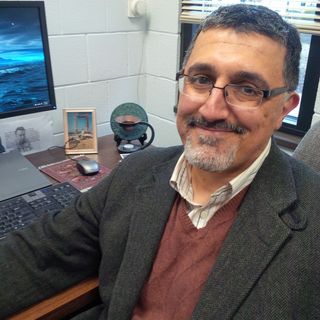
Threats and Hate Mail Reveal Climate Disinformation's Dark Side (Op-Ed)

Seth Shulman is a senior staff writer at the Union of Concerned Scientists (UCS), a veteran science journalist and author of six books. This op-ed, and Shulman's other Got Science? Columns, can be found on the UCS website. Shulman contributed this article to Live Science's Expert Voices: Op-Ed & Insights.
Lawrence Torcello, a philosophy professor at the Rochester Institute of Technology, never imagined he would become the focus of a vicious barrage of hate mail when, last month, he published an article in a British online journal about the ethics of climate-change misinformation.
But, sure enough, in recent weeks, Torcello has been subjected to death threats, racial slurs, and anti-gay and anti-Semitic epithets. He's been called a fascist, a Stalinist, a Nazi and a communist. One of the many contemptible emails he received, for example, reads simply: "DIE you maggot." An anonymous phone message ominously threatens that he'll "be paid a visit." In all, Torcello estimates that he has been subjected to more than 700 harassing calls, emails and tweets.

What did Torcello do to attract such a response?
He raised the ethical issue — in an academic venue, no less — of how society should contend with those who knowingly disseminate misinformation about climate science.
Sadly familiar
Before delving into the details, it's important to note that Torcello's case highlights an increasingly common form of harassment that is all too familiar to scientists and other researchers who have spoken out about climate change. Eminent climate scientists, such as Michael Mann and Benjamin Santer, have faced similar intimidation and even death threats. Mann was likened in print to a child molester; Santer was subjected to a dead rat on his doorstep, among many other similar incidents. [Michael Mann: Climate-Change Deniers Must Stop Distorting the Evidence (Op-Ed)]
Sign up for the Live Science daily newsletter now
Get the world’s most fascinating discoveries delivered straight to your inbox.
Torcello's case is particularly interesting, though, because he appears to have fallen victim to precisely the type of disinformation campaign he decried. He has seen his argument distorted beyond recognition by media outlets that thrive on half truths and politically charged controversy, whipping up the ire of an ugly and angry fringe in the process.
A philosophical argument
It should be clear to anyone who actually reads Torcello's article that he is wrestling with the philosophical question of how society should hold to account those who willfully distort climate science and disseminate misinformation. Of course, it's more than an academic question because it is a well-known fact that fossil-fuel interests have long been underwriting a disinformation campaign specifically designed to block climate action and confuse the public about the issue.
Torcello argues from a moral and philosophical standpoint that those who purposefully engage in misinformation campaigns ought to be considered criminally negligent. As he explains, the core idea of criminal negligence as a legal and moral concept is that people can be held responsible when they fail to exercise reasonable care that takes into account the potential harm their actions may cause to others. And, as Torcello rightly contends, climate misinformation campaigns are already causing widespread harm. [Is There a Climate Crystal Ball? (Op-Ed) ]
While you might reasonably disagree with Torcello's argument, of course, it's hard to imagine his views leading to a barrage of hate mail until you see the way certain media outlets chose to distort his views.
Blatant distortion
The first blatant distortion of Torcello's argument appeared on Breitbart.com, a politically conservative website, in an article that inaccurately alleged Torcello was saying that "scientists who don't believe in catastrophic man-made global warming should be put in prison." That inflammatory piece of misinformation was soon picked up on sites including The Daily Caller and FoxNation.
The Drudge Report stretched the distortion of Torcello's article even further, erroneously contending that he had "called for the incarceration of any American who actively disagrees that climate change is solely caused by human activity." Of course, Torcello had never said anything of the kind.
Nonetheless, a variety of climate misinformers quickly jumped in to further fan the flames. Blogger Anthony Watts branded Torcello "despicable" and urged his readers to contact Torcello and his institution. Britain's Lord Christopher Monckton, a longtime climate contrarian, wrote to the provost of the Rochester Institute of Technology, questioning Torcello's fitness "to hold any academic post at the Institute."
Torcello says he is grateful that his university came strongly to his defense, issuing a statement that both defended his academic freedom and underscored the scientific consensus about human-caused global warming. But he still marvels at the phenomenon.
"It still seems incredible to me that so many people would bother to write me or call me without actually having read my article," he says.
Disinformation: The real issue
Fringe groups can whip themselves into a frenzy all they like, but it doesn't change the fact that Torcello's academic article raises an important issue.
Society has known for years, and even decades, that the overwhelming scientific consensus is that human activity is leading the planet to dangerous and potentially catastrophic climate change. The latest report from the Intergovernmental Panel on Climate Change issues the most sober warnings yet about the imminent threat we face.
All the while, we've known that some fossil-fuel interests, such as ExxonMobil and Koch Industries, have purposefully, and often underhandedly, worked to confuse the public about the dangers their actions are causing to the planet. A detailed, peer-reviewed study by Robert Brulle at Drexel University offers a comprehensive analysis of the way these carbon producers and others have bankrolled front groups dispensing climate disinformation.
Meanwhile, recently published research shows that nearly two-thirds of the industrial carbon pollution released into the atmosphere since 1854 can be directly traced to the carbon extracted from the Earth by just 90 entities — 83 producers of coal, oil and natural gas, and seven cement manufacturers.

So, it's becoming increasingly clear who's actually driving climate change. In that sense, questions like Torcello's are becoming more urgent. How should those who knowingly disseminate disinformation about climate change be held accountable? And what kind of responsibility do the major carbon producers have for climate-related damage they continue to cause to people around the globe?
Fighting back
Regardless of the answers that ultimately emerge to those questions, it is clear that a reasonable debate does not include hate mail and harassment.
Unfortunately, however, Torcello's case is common enough that my colleagues at the Union of Concerned Scientists decided to publish a primer offering helpful pointers about how harassed scientists should respond, including the following:
1. Avoid getting pulled into debates with people who only seek to waste your time;
2. Respond only through mainstream sources or your own blog; and
3. Keep records of harassing messages, and contact authorities if they become threatening.
Torcello says the response he has received has shown him that "those seeking to distort the findings of climate science are equally willing to distort philosophical and political argument with blatant acts of dishonesty." It's a sad reality that those who write about climate change now must prepare for this sort of harassment, and that universities and other organizations need to be prepared to support their employees during such assaults as well.
Still, even ugly harassment can't be permitted to shut down a debate whose time has come.
Shulman's most recent op-ed was "Momentum Builds for Deforestation-Free Palm Oil." This op-ed, and Shulman's other Got Science? Columns, can be found on the UCS website. The views expressed are those of the author and do not necessarily reflect the views of the publisher. This version of the article was originally published on Live Science.
Most Popular

